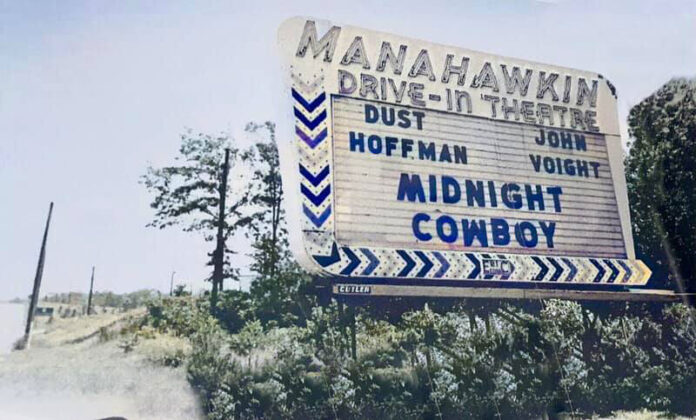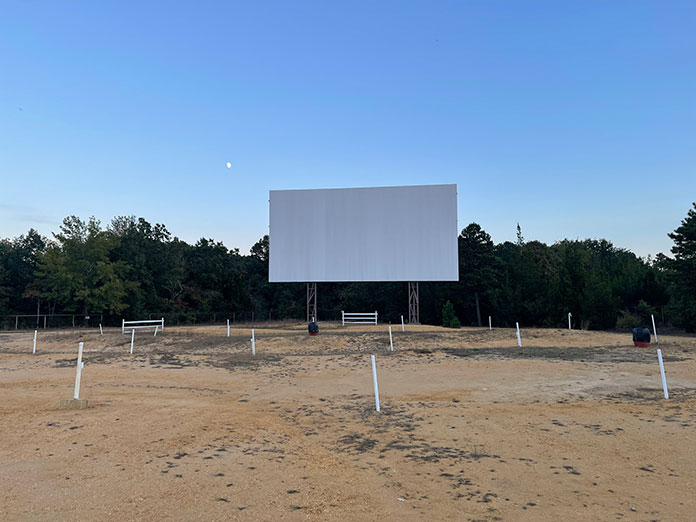
MANAHAWKIN – Advertisements splashed across the digital billboard near the intersection of Routes 72 and 9 aren’t exactly a novel use of the same space.
For a number of decades, the identical location used big letters to broadcast the names of feature movies shown on a large outdoor screen. The Manahawkin Drive-In Theatre’s grand marquee may be long gone, but certainly not forgotten.
While some news organizations and bloggers point to the Bed Bath & Beyond/Kohls/Home Depot shopping center as the site of the old Manahawkin Drive-In, property records show otherwise. The Holiday Inn Mainland and Adventure Park now stands on the land once leased by the legendary entertainment venue from the late Toms River attorney Joseph Citta.
From possibly the late 1950s until the late 1970s, the Manahawkin Drive-In was the hot place to go for families, teens, and lovers of all ages.
Some folks would forego the sound and take in the big screen alone settled across the street at the Manahawkin Lake.
Summer vacationers and locals alike piled their kids into station wagons even before the onset of dusk. Children hit the playground onsite and pestered their parents for popcorn and treats from the refreshment stand. Many had already donned pajamas and would later be carried into their beds.
“My parents bought our vacation house on LBI in 1967,” Leslie Brower shared. “I grew up summering there and remember you could actually view the movies showing from Route 72 as your drove by the theatre.”
Ric Waters, who graduated from Southern Regional High School in 1981, has lived in different parts of the Long Beach Island since he was a child. Waters’ father taught at the high school and was a familiar face with the kids who manned the theatre’s drive-in ticket booth.

The minute Ric’s father stuck his head out of the window and took his hat off, an arm would surface from the ticket booth and wave the family car through at no cost. Meanwhile, the Waters weren’t the only ones who made it past the line.
At times, the Manahawkin Drive-In ran specials charging $1 for entire carloads to enter the lot. Some squished together in both the front and back seats, while others stuffed themselves into trunks. Later they’d move to the hoods or roofs of their cars to take in the movies under the stars.
One big pest was the onslaught of mosquitos that some described as the size of hummingbirds. Repellant cords seemed to do nothing to ward off the angry buggers, other than leaving a burning sensation behind.
“On Friday and Saturday nights we all used to get together,” recalled Diane McCabe, 69. “We would get in the back of my boyfriend’s pick-up truck and watch the movies and hang out together.”
McCabe, who lived in Barnegat as a teenager said the drive-in movies were one of two places locally that offered any kind of fun. The other was the skating ring located near the Manahawkin Flea Market on East Bay Avenue.
Those were the days local movies listings appeared in print newspapers such as the Asbury Park Press Evening News and even papers as far away as the Philadelphia Inquirer.

Back in 1959, the “Return of the Fly” was one of two horror movies to hit the big screen. A few years later in 1965, Sean Connery starred as James Bond 007 in a double feature showing “Dr. No” and “From Russia with Love.”
By the time 1971 hit, the drive-in theatre came up with an added attraction. A short newspaper article promoted a dance contest between the June presentation of “Gimme Shelter” by the Rolling Stones and the Beatles’ “Let it Be.”
Legend has it that at least one streaker made it across the big screen in 1974, the same year an American photographer and gallery owner did the same at the Academy Awards.
Movie ratings didn’t go into effect until 1968, which made it particularly interesting considering the fact that movies could be seen by motorists driving by.
Waters remembered his mother’s horror when the family was returning from Pennsylvania to their home on the island.
“My mom started freaking out all of sudden,” Waters said. “On the screen were a giant pair of female breasts, with a pair of hands touching them.”
The long ride had put most of the family to sleep and not all of the kids necessarily heard their mother’s instructions to put blankets over their heads. Waters was just nine years old at the time and did what he was told – although he did manage to sneak a peek from the rear of the station wagon.
Perhaps the only redeeming part of the picture was that it came without sound. Those who attended drive-in movies at that time required viewers to remove speakers from posts and hook them onto their cars.
Waters has such fond recollections of his time at the drive-in that he’s collected a set of speakers that dates back to the drive-in movie days. These particular speakers were not used at the Manahawkin Drive-In.
The last advertised movie listing at the Manahawkin Drive-In was for the Harper Valley PTA in 1978. However, some have suggested the theatre didn’t close down until 1981. By September 1982, the property took on a new look as a weekend flea market.

Behind The Screen
Although they were not the original owners of the Manahawkin Drive-In Theatre, Frank Theatres was in charge from at least the early 70s. The group also owned movie theatres on Long Beach Island, and others throughout New Jersey, Pennsylvania, West Virginia, North Carolina, South Carolina, Georgia and Florida.
The website address for Frank Theatres now links to Paragon Theaters, which appears to have subsequently bought out the Frank family after three generations of ownership.
Showings at the Drive-In ran from late spring until early fall with a lot of vacationers crossing back over the bridge to enjoy a movie under the stars.
Steve Lundy, who lived in the area when the drive-in was operational, had many fond memories of working for Frank Theatres while he was still in high school. In addition to the Manahawkin Drive-In Theatre, the Franks owned the Colonial Theatre in Beach Haven and the Colony Theatre in Brant Beach.
When he first began his employment with Frank Theatres, Lundy primarily worked at the two island theatres, which were both indoor venues. By the mid-1970s, Lundy was a full-time projectionist at the Colonial and Colony Theatres. He did maintenance work at the Manahawkin Drive-In, where he also filled in as a relief projectionist.
As part of Lundy’s maintenance work, he would replace the speakers when they would quit because they were out in the weather all the time. Alternatively, the speaker’s volume system would die after a while. Then, there were the teens who wanted to have a sound system in their cars and snagged them off the poles to bring home.
The theatres used a carbon arc with a lamp with a big parabolic mirror behind it. Bright spotlights converted to movie theater projector lights. The size of the outdoor screen was such that an enormous carbon arc light for the projectors was needed to illuminate more brightness than that required for an indoor theatre.
“The lamps would feed the carbon rods together at a certain rate so they would always stay a certain distance apart,” explained Lundy. “The carbon rods would last through about two or three reels and then needed to be changed.”
“We were running twenty minute reels on each side and would change the projector while one was running and put the new film in for the next twenty minutes,” Lundy continued.
The RCA projectors were considered state of the art at the time. However, as the carbon rods burned, they created smoke that was let out by a chimney.
“The thing that was the shocker for me about the drive-in projection booth was the shower in there,” Lundy shared. “It was so hot in there that in between reels, the projectionist would run in the shower, hose off and dry himself off, and come out.”
One added benefit came at the end of the night when the concession stand was ready to close. Sometimes they had leftover hamburgers and fries and passed them on to the projectionists.
A not so pleasant memory hit Lundy as he recalled his duties associated with the theatre’s marquee out front.
“I was helping this friend put up the names of the movies,” said Lundy. “There were hooks on the back of the letters that hooked onto to the racks. As we put together the name of the movie’s title, one of the letters didn’t hook correctly came down and hooked me right in the nose.”
The letter was made of a flat piece of aluminum and hurt more than a little when it landed.

The Fly-In Drive-In
While many in the generation now referred to as the boomers may recall the Manahawkin Drive-In Theatre, not all realize there was another on Route 72.
A gentleman named Edward I. Brown; Jr. decided patrons might enjoy the novelty concept of a fly-in drive-in outdoor movie theatre at the southern portion of the Jersey shore.
Brown had already set up the first fly-in drive-in theatre at the Monmouth County Airport on Route 34 in Wall. He figured pilots and their passengers would enjoy watching movies from the cockpit or back seat of their airplanes.
The Asbury Park Evening News reported on the May 10, 1957 ribbon cutting ceremony for the new airport and Fly-In theatre at what is now Walmart on Route 72. Free airplane rides were offered to the first 25 cars that attended the event. Ladies received corsages and kids had the chance to visit the playground and munch on free popcorn.
A radio show hosted by David Ripley of Ripley’s Believe It or Not was so impressed with the concept that they invited Brown to discuss it.
In the end, the Fly-In/Drive-In Theatre lasted only a couple of years.
Drive-Ins Across The Nation
New Jersey actually served as home to the first drive-in movie theatre in Camden County’s Pennsauken dating back to 1933. The Newark Moonlight Cinema opened last year, while the Delsea Drive-In Theatre in Vineland remains as the second permanently operating movie theatre in the state.

According to a website named Driveinmovie.com, over 4,000 drive-ins existed nationally during the 1950s. There are now approximately 325 drive-in theatres, with the largest number in Florida and Texas.
During the pandemic, drive-in movie theatres appeared in select locations throughout the nation.
Sometimes, it’s the simple things that make life easier.







